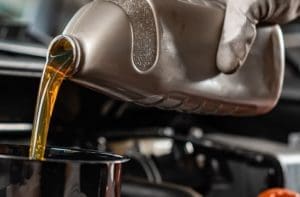
According to 2020 automotive sales data, over 20% of all new car purchases in the United States were made on European automobiles. European vehicles use advanced powertrain systems that improve fuel efficiency and deliver high performance. Day in and day out, automotive shops service a variety of different vehicles, including European vehicles. These European vehicles require European motor oil.
In the United States, the American Petroleum Institute (API) establishes oil standards. The API sets service categories to regulate motor oil performance requirements. Motor oils that meet API’s requirements feature an API logo on the package. This logo helps consumers identify quality motor oils for their gasoline- and diesel-powered vehicles.
Like the United States, the European Automobile Manufacturers Association (ACEA) sets guidelines for European motor oils. The ACEA oil sequences define the minimum quality level for use as a motor oil in European vehicles. One major difference between ACEA and API specifications is that European (ACEA) motor oil specifications have much tighter requirements for emissions and oil change intervals. Using the incorrect motor oil in a European vehicle could damage the engine and lead to engine failure.
Emissions
With tougher regulations for carbon dioxide (CO2) emissions in Europe, many light-duty European vehicles are equipped with diesel engines, which emit less CO2 than gasoline engines. However, diesel engines also generate more nitrogen and particulate matter. Diesel particulate filters (DPFs) are often installed to help reduce these emissions.
Additives in the motor oil can impact the performance and longevity of both the engine and DPF. ACEA requires European motor oils to specify the level of SAPS (sulfated ash, phosphorus, and sulfur) contained within the oil itself. SAPS provide anti-wear protection, improve engine cleanliness, and enhance the oxidative stability of the oil. However, too much sulfated ash can clog the filter and cause deposits to form inside the engine – both of which can be harmful.
In general, Mid-SAPS European oils are suitable for use in most light-duty European vehicles that utilize DPFs. Low SAPS options are recommended for European vehicles with more sensitive DPF devices.
Oil Change Interval
Another difference between European and conventional motor oils is the oil change interval. Most American cars and trucks require oil changes about every 5,000 miles. On the other hand, European vehicles are designed to go upwards of 10,000 miles between oil changes.
With these extended drain intervals, European oils must be able to protect against wear, corrosion, and dirt longer than their American counterparts. They are also built to protect the engine for an extended period and allow for the longer mileage between oil changes.
Oil Selection Matters
The incorrect oil in a European car can have a dramatic impact on the engine and its components. High-performance engines found in BMWs, Volkswagens, Mercedes, and other European vehicles are designed to control emissions and extend traditional drain intervals. Therefore, these engines require specialized European motor oils.
It is important to refer to the vehicle owner’s manual for proper fluid selection. Demand for European vehicles is increasing in the United States. Therefore, auto shops should consider keeping common viscosities of European motor oil on hand.
Lube-Tech is a prominent manufacturer and distributor of oils that meet the requirements for European vehicles. Not sure which products you need? Contact us today for expert help.
